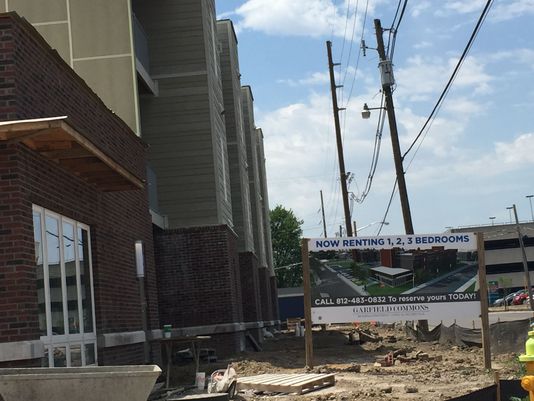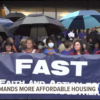May 10, 2018. Courier & Press.
EVANSVILLE, Ind. — At the urging of a group of local churches, Mayor Lloyd Winnecke said his 2019 budget proposal will include $500,000 to boost affordable housing initiatives.
City Council will have the final say over whether the funding stays or goes. Work on next year’s new budget starts in August.
Evansville’s need for adequate, low-income housing is immense. The inventory is about 5,000 units short, according to Congregations Acting for Justice and Empowerment. CAJE strives to influence public policy on local issues of interest.
The housing gap “is very difficult for families,” said Linda Henzman, a CAJE board member. “Rent (locally) averages $780 a month, not including utilities. We found out families are choosing between groceries and rent or medicine and rent, or are moving often, creating unstable situations for children and people with health problems.”
The community’s cheapest housing solutions often are not energy-efficient, and this offsets savings in rent, Henzman said.
City Council President Jim Brinkmeyer has said he will support Winnecke’s full $500,000 request for the Affordable Housing Trust Fund.
Other City Council members, while saying they recognize the need for more affordable housing, said they want to consider the entirety of Winnecke’s budget proposal before committing to specific line items.
If approved by City Council, the $500,000 would come from casino revenues. The trust fund’s balance has fluctuated, and CAJE often has called for additions.
The trust fund currently has about $200,000. It is managed by a citizen committee of mayoral and City Council appointees. Dave Clark is the current president.
Department of Metropolitan Development Director Kelley Coures said the trust fund helps boost housing in two ways. Income-qualified families or individuals can apply for grants to facilitate a necessary repair or upgrade to their home, allowing them to stay in it.
Common examples are roof work and ramp construction.
The trust fund also is a source of gap funding for developers of new housing, who need a lift to qualify for a state funding source or tax credit.
City Council last year passed an ordinance tweaking governance of the trust fund, addressing concerns councilors have expressed over the years.
Developers no longer may receive grants, they can only get loans. Also, even though the trust fund has oversight from an appointed committee, the City Council gets final say when a developer is loaned money.
Coures said those changes stemmed from City Council unhappiness with some decisions by the trust fund’s committee, including a case when money was loaned to a developer for unpaid property taxes.
The loan was forgiven sometime later when it was not repaid.
New trust fund rules also require that half of its money must assist individuals at less than 50 percent of Evansville’s median income. The previous requirement was 80 percent of median income.
Coures said the trust fund by itself can’t pay to build new housing units. Constructing only one unit costs about $200,000.
He noted a few planned and pending developments of permanent affordable housing around the city, such as the nearly finished 44-unit Garfield Commons project on Virginia Street; the upcoming 64-unit Central Lofts project in a YMCA-owned building on Fifth Street; and a planned 27-unit development at 101 N. Garvin St.
View original article.






